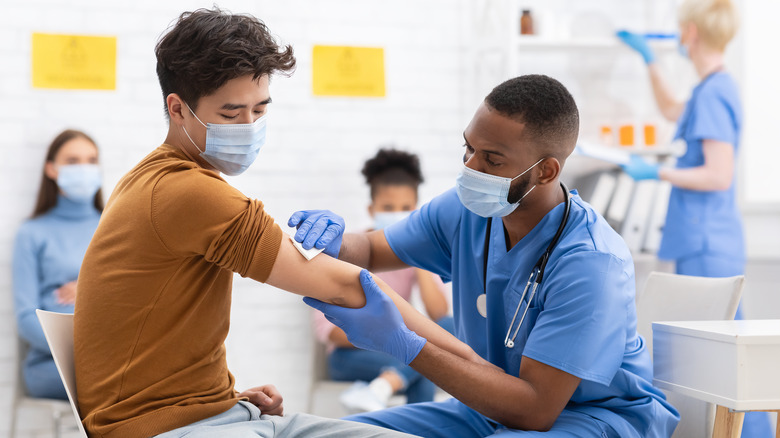Will Self-Boosting Vaccines Soon Be An Option?
Wouldn't it be great to have a vaccine that automatically updates itself without having to get another jab? A recent study published on July 13, 2022 in Science Advances details how there may be a future possibility of self-boosting vaccines, thus eliminating the need for additional booster shots of a variety of vaccinations from the annual flu to COVID-19. The study, along with further ongoing research, is conducted by a team from the Massachusetts Institute of Technology (MIT) and the anticipation is that potential advances in microparticle-based medicine can create solutions to vaccines that require multiples and boosters, as well as relieve an annual burden of up to $100 billion from the United States healthcare system.
Healthline reports that the researchers are looking into ways to use microparticles to stagger the administration of vaccines in the body's bloodstream, thus providing longer protection from a variety of illnesses for which multiple doses of vaccines are currently used. The microparticles used in the vaccination technology resemble tiny coffee dispenser pods, but rather than coffee they will dispense critical components for immunity. For some vaccines, including the COVID-19 and influenza vaccinations, this technology could present the possibility of a single vaccine dose being all that patients will need, rather than requiring multiple booster shots. While the research and development of the technology is ongoing and not yet available for market use, the study indicates the reality of future self-boosting vaccines.
More people can be protected
The technology from the MIT-based team may also make medicine more accessible to people without current access to adequate medical care. Dr. J. Wes Ulm, a clinical fellow at University of Pittsburgh Medical Center, tells Healthline that "This approach could potentially be revolutionary for several applications, but above all for facilitating options for relatively underserved communities with limited or uncertain access to healthcare resources, and whose members may have difficulty in following up with trained medical personnel to receive administrations of medications, vaccines, or other drugs entailing a multi-dose series scattered over weeks or months." The study reports that only an estimated 50% of people globally adhere to vaccination schedules, and having the technology to provide a single dose of self-boosting injections is expected to have a positive impact on protecting a greater portion of the world's population from preventable illnesses.
It's possible that the same technology that the study's team is using could eventually revolutionize treatment of chronic conditions like diabetes, hypertension, and high cholesterol (via Healthline). According to the Centers for Disease Control and Prevention (CDC), approximately 38% of Americans are living with high cholesterol. Additionally, nearly 50% of adults in the United States have hypertension (per Million Hearts). Being able to provide solutions to these pervasive conditions without having to take daily medication would have groundbreaking effects on healthcare systems both in the United States and globally, as well as improve the lives of hundreds of millions of people.


